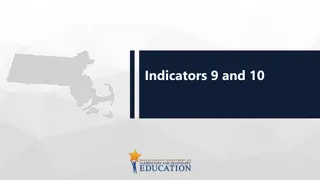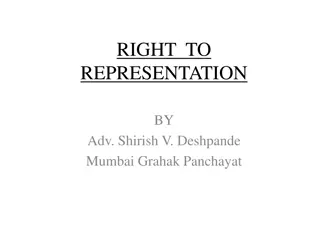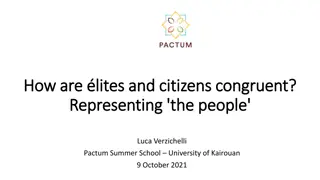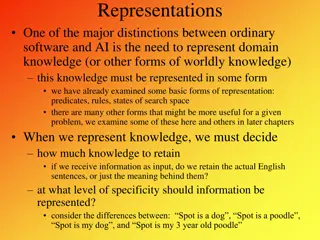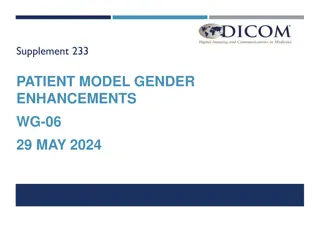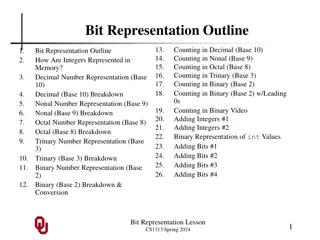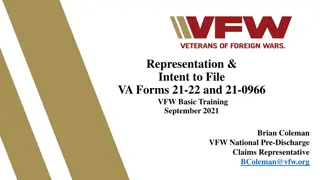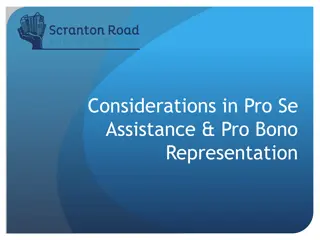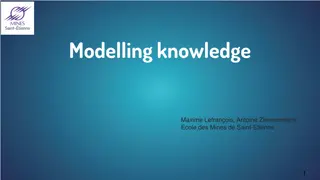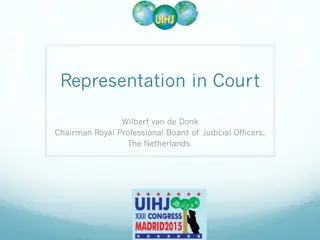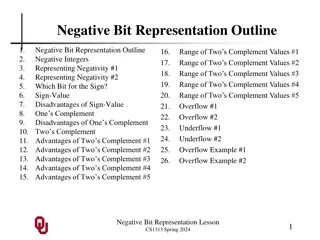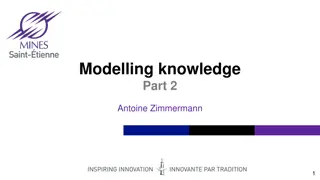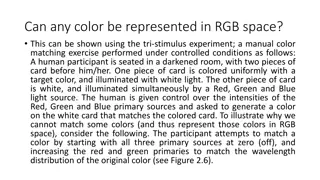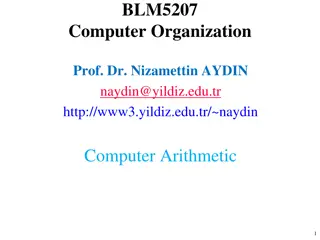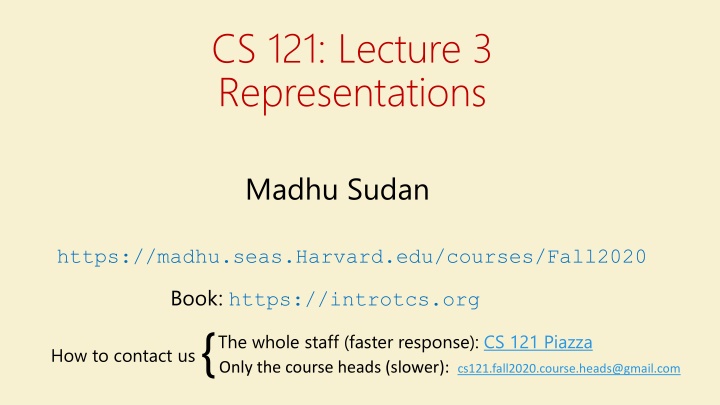
Effective Representation Schemes for Data Manipulation
Explore the concept of representation schemes in computer science, focusing on encoding, compression, error correction, data structures, and more. Discover how different representations play a crucial role in various aspects of computing and information processing.
Download Presentation

Please find below an Image/Link to download the presentation.
The content on the website is provided AS IS for your information and personal use only. It may not be sold, licensed, or shared on other websites without obtaining consent from the author. If you encounter any issues during the download, it is possible that the publisher has removed the file from their server.
You are allowed to download the files provided on this website for personal or commercial use, subject to the condition that they are used lawfully. All files are the property of their respective owners.
The content on the website is provided AS IS for your information and personal use only. It may not be sold, licensed, or shared on other websites without obtaining consent from the author.
E N D
Presentation Transcript
CS 121: Lecture 3 Representations Madhu Sudan https://madhu.seas.Harvard.edu/courses/Fall2020 Book: https://introtcs.org { The whole staff (faster response): CS 121 Piazza How to contact us Only the course heads (slower): cs121.fall2020.course.heads@gmail.com
Announcements HW0 graded; solutions posted; Feedback sent. HW1 out; due 1 week from today. Section 1 material + video posted. New expectations: Watch video in section: Thu+Fri. Must pre-watch video for sections: Sat.-Wed. Reminder Boaz Barak on Compression, Coding and Entropy today at 4:30! (Canvas Zoom CS 121.5)
Today Main message: Can represent everything with 0,1 Will define represent and explain everything Lesson 1: Can represent with 0,1 Break 1: Lesson 2: Representing with Break 2: Lesson 3: Prefix-free representations. Representing End: Can t Represent
Representations: Motivation Computers manipulate data. But what is data? Can all data be expressed as bits? Answer 1: Yes don t we already do it? Answer 2: Obviously! There are so many ways to do it! Pick your favorite. Today s Central Player: 0,1 = ? 0,1? All finite length binary strings
Definition: A representation scheme for a set of objects ? is a one to one function ?:? {0,1}
Definition: A representation scheme for a set of objects ? is a one to one function ?:? {0,1} Equivalently: There is ?:{0,1} ? s.t. ? ? ? = ? for every ? ?
Definition: A representation scheme for a set of objects ? is a one to one function ?:? {0,1} Much research on good representations: Effectiveness: Can compute encoding and decoding Compression: Representation with small size (e.g., JPEG) Error correction:Representation that is robust to errors (e.g., control digits , error correcting codes) Data structures: Representation enabling fast operations (e.g., binary numbers, distance oracles) Feature extraction: Representation enabling prediction (e.g., deep nets) Secrecy: Representation hiding certain information (e.g., encryption) Equivalently: There is ?:{0,1} ? s.t. ? ? ? = ? for every ? ? Today: Simple representations for standard objects.
Binary representation One to one function ?: {0,1} ? 83 = 64 32 16 8 4 2 1 ? 17 = 16 8 4 2 1
Binary representation ? ?(?) 2 4 6 0 1 10 100 110 0 1 One to one function ?: {0,1} ? 83 = 1010011 64 32 16 8 4 2 1 1 0 1 0 0 1 1 ? 17 = 10001 I always work in base 10. 16 8 4 2 1 1 0 0 0 1
Exercise 1: Give a representation of 3 = 0,1,2 as binary strings. Specifically give the encoding function Prove it is one-to-one (or give decoder) Give an upper bound on the ratio ? ? Now improve the ratio! of your representation ?
Representing rational numbers Lemma: There is a one to one function ?:{0,1} {0,1} {0,1} ? ?,? ? encodes a pair of strings as a single string. ? What about ? ?? = ?? ? (You) Will prove lemma shortly! Corollary: Can represent as strings. Corollary: Can represent rational numbers as strings.
Proof of Corollary: Lemma: There is a one to one function ?:{0,1} {0,1} {0,1} Corollary: Can represent as strings.
Prefix freeness Definition: ?:? {0,1} is prefix free if for every ? ? , ?(?) is not prefix of ?(? ) 1 0 1 Example: 101 is prefix of 1010011 1 0 1 0 0 1 1 English is not prefix free: teacherstalking.com
Prefix freeness Definition: ?:? {0,1} is prefix free if ? ? , ?(?) is not prefix of ?(? ) Theorem (2.18): If ?is prefix free then we can use it to encode pairs/lists ?prefix free ? :? {0,1} defined as ? ?0,?1, ,??= ? ?0? ?1 ? ?? is one to one Lemma (2.20): Every encoding can be converted into a prefix-free one If ?:? {0,1} , then there exists prefix-free one-to-one ? :? {0,1} Lists of lists of images = videos lists of lists of numbers = matrices lists of numbers numbers images
Exercise 2: Give a prefix free mapping: ?: 0,1 0,1 Hint (example): 0010100 0010100# Give an upper bound on the ratio ? ? for your ?. ? (If you have extra time, try to think of ? s that improve the ratio.)
E.g., Representing Graphs ? = ?,? ; ? = [?] ; ? ? ?
Example: Representing Matrix ? ? ?: First represent list Then represent list of lists
Prefix-free encoding in practice C style strings : null terminated Pascal style : encode ? {0,1} 255 as ? ,? ..both led to many security breaks
TLS Heartbeat protocol ? ,? Check connection is alive: ? ,?
Heartbleed attack Some might argue that it is the worst vulnerability found (at least in terms of its potential impact) since commercial traffic began to flow on the Internet. , Joseph Steinberg , Forbes.
Can we represent everything? Unfortunate Fact (Thm 2.5): Can t represent real numbers as strings There is no one-to-one function ???: {0,1}
Implications Thesis: Everything representable as 0,1 ! Everything = Or Everything = 0,1 Or Everything = Keyboard Includes Music? All sounds? All images? All Smell? People ( Beam me up, Scotty! )
Rest of the course: Part I: Circuits: Finite computation, quantitative study Part II: Automata: Infinite restricted computation, quantitative study Part III: Turing Machines: Infinite computation, qualitative study Part IV: Efficient Computation: Infinite computation, quantitative study Part V: Randomized computation: Extending studies to non-classical algorithms



